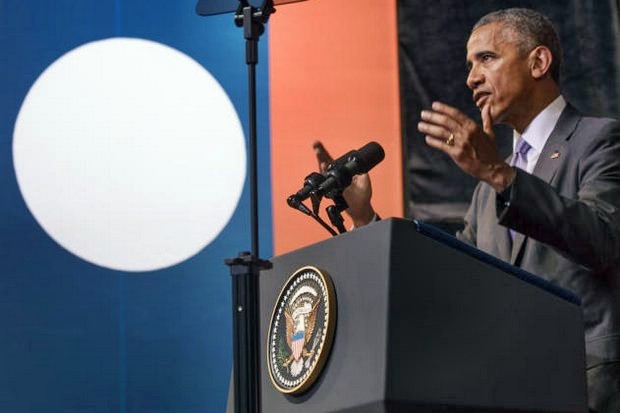
VIENTIANE - Barack Obama, on his final visit to Asia as US president, insisted Tuesday that renewed US engagement with the region would endure after he left the White House.
"America's interest in the Asia-Pacific is not new. It's not a passing fad. It reflects fundamental national interests," he said in a speech in the Lao capital of Vientiane.
President Obama, with a huge Lao flag in the background, said it was time to 'acknowledge the suffering and sacrifices' from the secret war in Laos, and pledged increased aid to find and dismantle unexploded bombs.
(Note: That war, of course, is not secret to readers of this newspaper.)
Mr Obama is making his 11th and last trip to the Asia-Pacific, seeking to cement a "pivot" to the region that has been a hallmark of his eight-year administration.
- Question time: Thai pair chosen to meet Obama
- Human rights: Asean must press Vientiane
During his speech in Laos, Mr Obama took time to summarise that policy, which has often been distracted by protracted violence and instability in the Middle East.
"As president, a key priority of my foreign policy has been to deepen our engagement with the nations and peoples of the Asia-Pacific," he told delegates, adding that he remained "confident" the new engagement would last.
Mr Obama trumpeted increased military cooperation with countries such as the Philippines, Singapore and India, as well as a push for greater trade with the region, and vowed this would continue.
"We are here to stay. In good times and bad, you can count on the United States of America," Mr Obama said.
He also addressed concerns in China.
"The United States and China are engaged across more areas than ever before."
He added that Washington "welcomes the rise of a China that is peaceful, stable and prosperous and a responsible player in global affairs because we believe that will benefit all of us".
But he also reiterated his steadfast support for access to disputed waters in the region which China claims as its own.
"Across the region, including in the East and South China Seas, the United States will continue to fly, sail and operate wherever international law allows and support the right of all countries to do the same."
Meanwhile, deputy government spokesman Werachon Sukondhapatipak said Prime Minister Prayut Chan-o-cha and his Lao counterpart, Thongloun Sisoulith, held a bilateral meeting.
Maj Gen Werachon said the two leaders followed up on matters discussed in a previous official visit by the Lao leader to Thailand, including the possibility of improving Thai and Lao tourism.
The possible joint development of Thai-Lao infrastructure was also discussed at Tuesday's meeting.